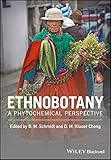Ethnobotany : a phytochemical perspective / edited by B.M. Schmidt and D.M. Klaser Cheng.
Material type: TextPublication details: Hoboken, NJ : John Wiley & Sons Ltd, 2017; ©2017Description: 1 online resource (xvii, 357 pages)ISBN: 9781118961919; 1118961919; 9781118961926; 1118961927; 9781118961933; 1118961935Uniform titles: Ethnobotany (Schmidt) Subject(s): MEDICAL / Pharmacology | Ethnobotany | Ethnobotany -- Case studies | Medicinal plants | Medicinal plants -- Case studies | Materia medica, Vegetable | Materia medica, Vegetable -- Case studies | Human-plant relationships | Human-plant relationships -- Case studies | Ethnobotany | Human-plant relationships | Materia medica, Vegetable | Medicinal plants | Plants, Medicinal | Phytochemicals | Phytotherapy | Medicine, TraditionalNLM classification: QV 766Online resources: Wiley Online Library Summary: "Ethnobotany: A Phytochemical Perspective explores the chemistry behind hundreds of plant medicines, dyes, fibers, flavors, poisons, insect repellants, and many other uses of botanicals. Bridging the gap between ethnobotany and chemistry, this book presents an introduction to botany, ethnobotany, and phytochemistry to clearly join these fields of study and highlight their importance in the discovery of botanical uses in modern industry and research. Part I. Ethnobotany, explores the history of plant exploration, current issues such as conservation and intellectual property rights, and a review of plant anatomy. An extensive section on plant taxonomy highlights particularly influential and economically important plants from across the plant kingdom. Part II. Phytochemistry, provides fundamentals of secondary metabolism, includes line drawings of biosynthetic pathways and chemical structures, and describes traditional and modern methods of plant extraction and analysis. The last section is devoted to the history of native plants and people and case studies on plants that changed the course of human history from five geographical regions: Africa, the Americas, Asia, Europe, and Ocean. Throughout the entire book, vivid color photographs bring science to life, capturing the essence of human botanical knowledge and the beauty of the plant kingdom"--Provided by publisher.
TextPublication details: Hoboken, NJ : John Wiley & Sons Ltd, 2017; ©2017Description: 1 online resource (xvii, 357 pages)ISBN: 9781118961919; 1118961919; 9781118961926; 1118961927; 9781118961933; 1118961935Uniform titles: Ethnobotany (Schmidt) Subject(s): MEDICAL / Pharmacology | Ethnobotany | Ethnobotany -- Case studies | Medicinal plants | Medicinal plants -- Case studies | Materia medica, Vegetable | Materia medica, Vegetable -- Case studies | Human-plant relationships | Human-plant relationships -- Case studies | Ethnobotany | Human-plant relationships | Materia medica, Vegetable | Medicinal plants | Plants, Medicinal | Phytochemicals | Phytotherapy | Medicine, TraditionalNLM classification: QV 766Online resources: Wiley Online Library Summary: "Ethnobotany: A Phytochemical Perspective explores the chemistry behind hundreds of plant medicines, dyes, fibers, flavors, poisons, insect repellants, and many other uses of botanicals. Bridging the gap between ethnobotany and chemistry, this book presents an introduction to botany, ethnobotany, and phytochemistry to clearly join these fields of study and highlight their importance in the discovery of botanical uses in modern industry and research. Part I. Ethnobotany, explores the history of plant exploration, current issues such as conservation and intellectual property rights, and a review of plant anatomy. An extensive section on plant taxonomy highlights particularly influential and economically important plants from across the plant kingdom. Part II. Phytochemistry, provides fundamentals of secondary metabolism, includes line drawings of biosynthetic pathways and chemical structures, and describes traditional and modern methods of plant extraction and analysis. The last section is devoted to the history of native plants and people and case studies on plants that changed the course of human history from five geographical regions: Africa, the Americas, Asia, Europe, and Ocean. Throughout the entire book, vivid color photographs bring science to life, capturing the essence of human botanical knowledge and the beauty of the plant kingdom"--Provided by publisher.
| Item type | Current library | Call number | Status | Date due | Barcode | Item holds |
|---|---|---|---|---|---|---|
 e-Books
e-Books
|
Central Library, Sikkim University | Not for loan | E-2881 |
"Ethnobotany: A Phytochemical Perspective explores the chemistry behind hundreds of plant medicines, dyes, fibers, flavors, poisons, insect repellants, and many other uses of botanicals. Bridging the gap between ethnobotany and chemistry, this book presents an introduction to botany, ethnobotany, and phytochemistry to clearly join these fields of study and highlight their importance in the discovery of botanical uses in modern industry and research. Part I. Ethnobotany, explores the history of plant exploration, current issues such as conservation and intellectual property rights, and a review of plant anatomy. An extensive section on plant taxonomy highlights particularly influential and economically important plants from across the plant kingdom. Part II. Phytochemistry, provides fundamentals of secondary metabolism, includes line drawings of biosynthetic pathways and chemical structures, and describes traditional and modern methods of plant extraction and analysis. The last section is devoted to the history of native plants and people and case studies on plants that changed the course of human history from five geographical regions: Africa, the Americas, Asia, Europe, and Ocean. Throughout the entire book, vivid color photographs bring science to life, capturing the essence of human botanical knowledge and the beauty of the plant kingdom"--Provided by publisher.


There are no comments on this title.